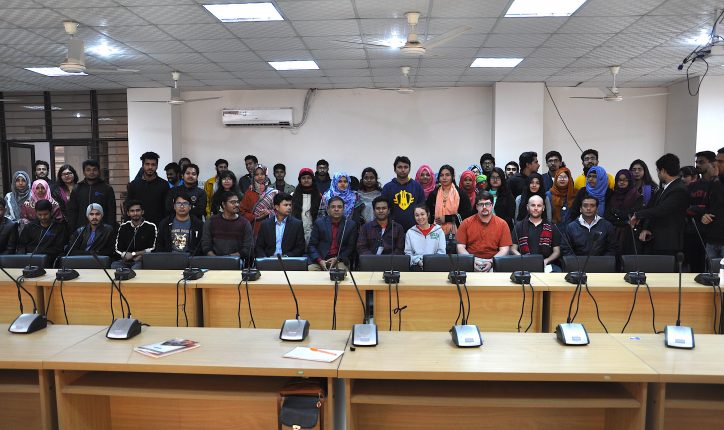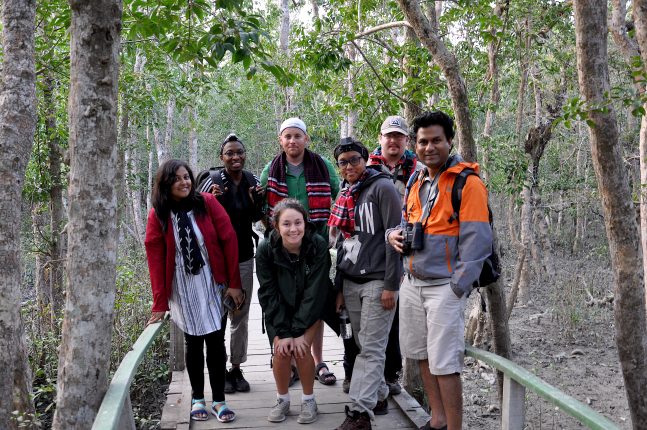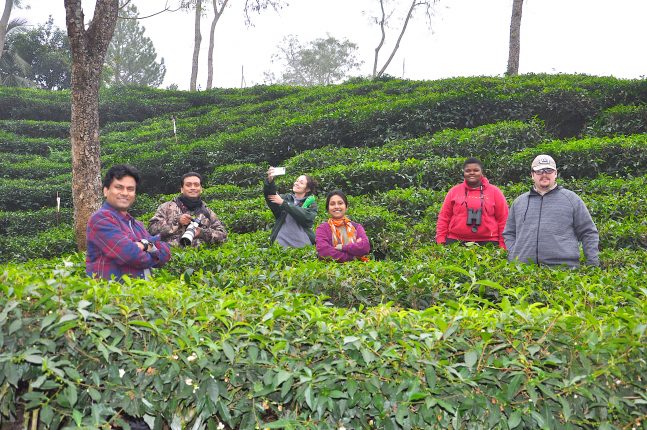 DSU participants used a small country-made boat to explore narrow canals in the Sundarbans forest. The team lived on the bigger boat in the background.
DSU participants used a small country-made boat to explore narrow canals in the Sundarbans forest. The team lived on the bigger boat in the background.
A group of Delta State students and faculty members recently returned from successful study abroad courses in Bangladesh. Associate Professor Dr. AHM Ali Reza from biology and Assistant Professor Dr. Joe Lane from geography offered Tropical Field Biology and South Asian Regional Geography, respectively, during the winter intersession. Four students signed up: Michael Zarske, a senior majoring in environmental science-wildlife science, and Margarita Ossorio, a junior majoring in digital media arts, for Tropical Field Biology; and Isabellla Escobedo, a sophomore majoring in history, and Sykina Butts, a junior majoring in English-philosophy, for South Asian Regional Geography. Dr. Donna Ossorio, assistant professor of social justice and criminology, also joined the Study Abroad Bangladesh team.
The Delta State Study Abroad Bangladesh team partnered with Jahangirnagar University (JU), a leading public university in Bangladesh, which served as the local host. The DSU team interacted with local students, faculty members and administrators. The team also conducted social science and biology class projects. Additionally, the team conducted an interactive session on how to approach higher study in the U.S. and at Delta State. More 100 local students, researchers, and junior faculty members participated. The DSU team further visited with the JU Vice Chancellor (equivalent to the president at DSU), Professor Farzana Islam, spending more than an hour at her residence.

The team arranged an interactive session for local students to learn about U.S. universities and about Delta State
The DSU team spent about a week in the Sundarbans mangrove forest, the UNESCO declared World Heritage Site and the largest mangrove forest in the world. In Sundarbans forest, the DSU team lived on a boat and learned about the unique biodiversity of the forest and little-known lifestyle of the forest dwellers. The Sundarbans forest holds the last stronghold of Bengal tiger population in Bangladesh. The DSU team also visited a temporary village on a small island in the extreme southern part of the Sundarbans forest. The village is occupied by 10,000 fishermen for only three months in winter. The DSU team distributed warm clothes to them since they have few resources.

The team explored the largest mangrove forest in the world, the Sundarbans Mangrove Forest.
Toward the end of the program, the DSU team spent a few nights in the northeastern evergreen forest of Bangladesh, the Lawachara National Park, famous for its unique biodiversity. Visitors can observe six wild primate species in a day over and above many other wild animals and plants. The national park is surrounded by tea gardens. The team saw the tea plantation in Bangladesh and the life associated with tea gardens. Bangladesh is one of the leading tea-producing countries in the world.

The team spent time in a tea garden and learned about the life of the tea gardeners.

